Things You Can’t Do After Gastric Bypass
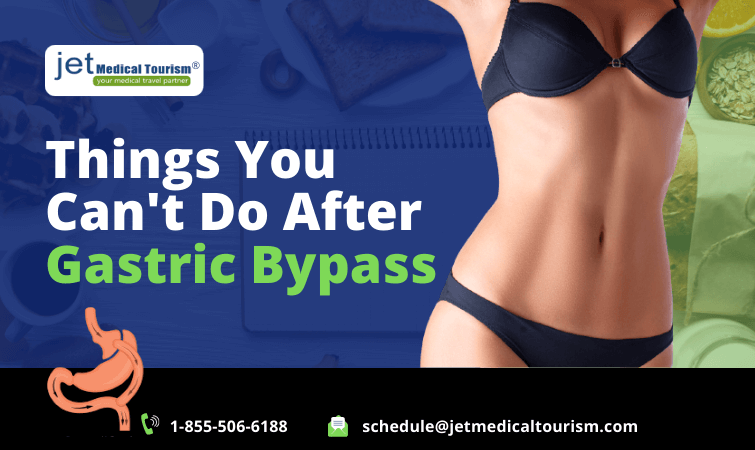
Things you can’t do after gastric bypass are primarily related to certain dietary restrictions. It is important to understand that gastric bypass surgery is the beginning of your weight loss journey, it is not the end. You will need to have a lifelong commitment to a balanced diet and regular exercise. Clearly, the rewards of following a healthy lifestyle are enormous.
You will be able to say a permanent goodbye to obesity. All your obesity-related underlying medical conditions will either improve or the symptoms may entirely disappear. You can lead a more fulfilling, happy, and long life. If there are certain things you can’t do after gastric bypass, they will be more than compensated with the things you can do!
Wish to learn about the things you can’t do after gastric bypass surgery? Talk to the bariatric surgeons at Jet Medical Tourism® to know all about it. Call us now to set up a consultation!
Life after gastric bypass surgery
Life after gastric bypass surgery is going to be full of health and vitality for most people. The procedure will dramatically improve your quality of life and enable you to maximize the vibrant opportunities that life offers you both personally and professionally.
You will have some limitations (mostly diet-related) about the things you can’t do after gastric bypass. Certain important changes in your life will occur in the following areas:
- Nutrition: Gastric bypass surgery reduces your body’s capacity to absorb calories and nutrients. You will have to focus more on healthy and nutritious foods throughout your life as well as take your recommended daily nutrition supplements.
- Fluid Intake: Following a Roux-en-Y surgery, your ideal goal should be to drink at least 64 oz. of fluids every day. Staying well-hydrated is paramount to maintain your energy levels and ensure that your body organs continue to function optimally at all times.
- Medications: If you have been taking certain medications for obesity-related diseases such as diabetes, your dependence on them may reduce. Your doctor may adjust your prescription for some other drugs because the absorption levels change after this surgery.
- Physical Fitness: Your focus on nutrition after your gastric bypass surgery must be accompanied by a fitness and exercise regimen. One of the things you can’t do after gastric bypass is to lead a sedentary lifestyle. Regular physical activity will help you remain in top shape.
- Mental Health: As you progress towards winning your battle against obesity, you will become mentally and emotionally stronger. Your self-image and personal confidence levels will improve. You can enjoy a more sound sleep and eliminate stress from your life.
YOU MIGHT ALSO LIKE: Gastric bypass weight loss chart, timeline 2020
Foods you can’t eat after gastric bypass surgery
Patients are often worried that they may not be able to eat or enjoy the foods of their choice after Roux-en-Y surgery. This is a myth. Only in the first few weeks after your surgery, there will be significant dietary restrictions. However, as the weeks and months progress, you can gradually return to solid foods and eat almost anything you want – but in moderation.
Gastric bypass surgery will help you achieve control and moderation in what you eat, how much you eat, and how frequently you eat. You can be creative with your recipes and enjoy almost every type of food in the long run. Things you can’t do after gastric bypass are essentially the same as what any health-conscious person should follow.
Q: What kind of fruit can I eat after gastric bypass
You can eat almost any type of fresh fruit after gastric bypass surgery, provided you limit your intake to just one serving. Fruits that are high in fiber content will benefit you the most. These may include apple, pear, avocado, and oranges. Different types of berries, such as strawberries, blackberries, blueberries, and raspberries are also good.
Q: Can I eat banana after gastric bypass
You should be able to eat bananas from the second month after your gastric bypass surgery. Bananas are high in potassium content, which is a vital nutrient for you after your surgery. But avoid eating bananas in the first four to six weeks post-surgery because your new stomach will need time to regain the digestive capacity for bananas.
Q: Can I eat mashed potatoes after gastric bypass
Yes, you can eat mashed potatoes after gastric bypass once you are off your initial liquid diet. Boil or bake the potatoes but do not fry them. Avoid adding any toppings that contain empty calories, and try to choose small potatoes. As long as you follow these suggestions, you can include mashed potatoes in your gastric bypass diet.
Q: Can you eat peanut butter after gastric bypass
Your nutritionist may ask you to avoid peanut butter for at least 12 weeks after your gastric bypass surgery. Although peanuts contain proteins, the high fat content in peanut butter is not good for you. But don’t count it among the things you can’t do after gastric bypass. Eat peanut butter occasionally as long as you are within your daily calorie goals.
Q: Can I drink sparkling water after gastric bypass surgery
No, sparkling water after gastric bypass surgery is not recommended, particularly in the initial few months. It is a bubbly, carbonated beverage, which can cause nausea, acid reflux, bloating, or stomach upset. However, some patients are able to tolerate sparkling water three to four months after their gastric bypass surgery.
Q: Can I have milk after gastric bypass
No, milk is not recommended after gastric bypass while your stomach and intestines are still healing. Lactose intolerance is fairly common among patients who undergo Roux-en-Y surgery. You can substitute milk with milk-based products, such as cheese or yogurt, which are good for you. Raw or liquid milk may cause bloating, abdominal cramps, or diarrhea.
Q: Can I eat pizza after gastric bypass
Yes, you can eat pizza, but not in your early months after your Roux-en-Y surgery. Once your stomach has fully regained its digestive capacity, your nutritionist may allow you to eat pizza occasionally. The key is to eat in moderation. Choose thin crust and add healthy toppings, such as vegetables, seafood, or chicken.
Q: Can I eat bacon after gastric bypass
No, it is best to avoid bacon in the first three to four months after your gastric bypass. Even later on, bacon does not sit well with a number of patients. If you love bacon, eat in small portions, chew it thoroughly, and see whether your body digests it. Also, consider turkey bacon which is more appropriate and equally delicious.
Q: Can I watermelon after gastric bypass
Yes, you can eat watermelon after gastric bypass in small portions. In the first few weeks, watermelon may not be a part of your recommended list of fruits. That is because this fruit contains high sugar content. However, the benefit is that watermelon can hydrate you more than any other fruit. So, use it in moderation after your nutritionist allows it.
Q: Can I eat a hamburger after gastric bypass
Yes, in the long run you can eat a hamburger after gastric bypass surgery. In fact, if you choose lean beef burger or turkey burger, it could serve as a healthy go-to meal after Roux-en-Y surgery. Burgers are easy to make, affordable, and most importantly, packed with proteins. Eat them in moderation when your nutritionist allows it.
Q: Can I eat ice cream after gastric bypass
No, you should avoid eating ice cream in the first three to six months after gastric bypass. Ice cream is made from milk, and it may cause stomach discomfort, nausea, or diarrhea after you have had your surgery. After you have fully recovered, you may try to eat ice cream in very small portions in consultation with your nutritionist.
Q: Why can’t you drink out of a straw after gastric bypass
Drinking with a straw after gastric bypass can impair your stomach healing and delay the recovery process. Medical researchers advise against the use of straw for drinking because it involves a suction process. This creates a negative pressure, which can counter natural clot formation and result in poor healing after a Roux-en-Y surgery.
Q: Can you chew gum after gastric bypass
No, you cannot chew gum after gastric bypass surgery. When you are chewing gum, the process will allow air to travel to your digestive tract. While normal people can tolerate this, but after a Roux-en-Y surgery, this can cause gastric discomfort. If you accidentally swallow chewing gum, it can also cause intestinal blockage.
Q: What happens when you overeat after gastric bypass
When you overeat after gastric bypass surgery, you may experience heartburn, indigestion, vomiting, diarrhea, abdominal cramps, or stomach upset. If you continue with the habit of overeating, you may develop the problem of dumping syndrome after your gastric bypass surgery. It can ultimately reverse your weight loss too. The risk is absolutely not worth it.
Q: What happens if you eat sugar after gastric bypass
When you eat sugar after gastric bypass, it can cause your insulin levels to rise to abnormally high levels. This is particularly risky if you suffer from type 2 diabetes. Regularly eating high sugar foods will also increase your risk of dumping syndrome. Drinking sugary beverages or foods with high fructose levels is one of the things you can’t do after gastric bypass.
Q: How many carbs after gastric bypass
You should consume about 60 grams of carbs per day during the first six months after Roux-en-Y surgery. From six to 12 months, you can increase your carbohydrates intake to 90 grams per day. One year post-surgery, you may eat up to 130 grams of carbs daily. With the right amount of carbs, you will maintain your weight as well as muscle mass.
RELATED READ: Gastric bypass diet
Foods to avoid after gastric bypass surgery
You can achieve and maintain your weight loss goals after Roux-en-Y surgery if you manage your daily diet prudently. The surgery will make it easy for you because you will have a small sized stomach and will not feel the urge to overeat. In reality, the only thing you can’t do after gastric bypass is to eat excessively. As long as you make this the golden rule of your everyday living, you will reap lifelong benefits.
- Empty Calorie Foods: These are the foods that deliver little to no nutritional benefits. Avoid too many cakes, pastries, chips, popcorn, pretzels, and sugary or fried foods, and you will do well after Roux-en-Y surgery.
- Pasta and Bread: These foods have high starch content. Following gastric bypass surgery, eating too much of breast, pasta and even rice can cause stomach blockage or perforation in the new pouch. Minimize their intake and eat in small bites.
- Tough Meats: Your goal should be to eat slowly and chew your food well for easier digestion after gastric bypass surgery. While lean meats such as chicken, turkey and fish are vital for proteins, you should avoid ham, hot dogs, pork chops and steak.
- Fatty Foods: Foods with high fat content can slow down or disrupt your weight loss journey after gastric bypass. Minimize the intake of whole milk, hard cheese, butter, sausages, and bacon. Replace them with low fat food options as far as possible.
Foods you can never eat after gastric bypass
Certain food items are best avoided following your surgery, but there are no such foods that you can never eat after gastric bypass. The reason for avoiding certain foods is to mitigate your risk of an adverse reaction. These foods may include:
- Calorie dense food items, such as cakes, chocolates, ice creams, and thick milkshakes.
- Dry and hard foods, which may not be easy to swallow after Roux-en-Y surgery, especially as you want to avoid drinking water with food.
- Foods which are high on the glycemix index, such as rice, pasta and bread, as they can spike your blood sugar levels rapidly.
- Highly caffeinated, carbonated or sugary drinks, which contribute to dehydration and increase the risk of dumping syndrome.
- Food items that increase flatulence, such as chewing gum.
- Alcoholic beverages, which are not only high in their calorie content, but may also damage your liver over time if you drink excessively.
Can you eat bread after gastric bypass
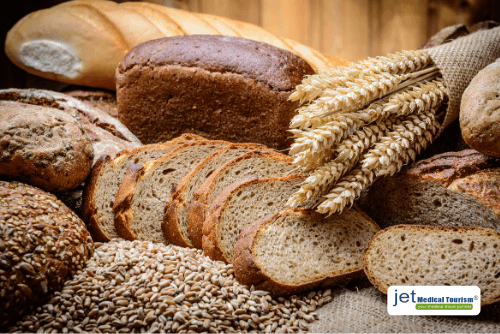
In the long run, if you want to eat bread after gastric bypass surgery, be selective and eat in moderation. Choose healthy toppings, such as cheese, avocado, chicken, or veggie salad. A number of options for bread are available in the market, and you can make your choices judiciously. Here are some suggestions for your bread selection after Roux-en-Y surgery.
- Wholemeal Bread: This is produced from wholegrains, so the fiber content is significantly higher than that of the typical white bread. Choose wholemeal bread that offers the highest fiber content.
- Wholegrain Bread: This bread is made entirely from grains. It includes three different fibers: soluble and insoluble fibers as well as resistant starch, which promotes gut health and satiety.
- Rye Bread: Made from rye grain, his bread is quite filling and tasty, when you eat it toasted. It is high on fiber content and is recognized as one of the whole grain breads with a unique flavor.
- Sourdough: It is produced different from traditional bread, and is packed with healthy bacteria and living yeast. You will be able to tolerate this bread more easily after your Roux-en-Y surgery.
Can I eat rice after gastric bypass
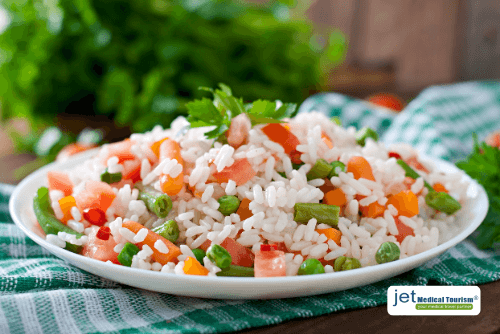
If rice is your staple diet or you are heavily inclined to eat rice, you should discuss alternatives with your doctor or nutrition expert. Do not hide the problem, and do not cheat on your gastric bypass diet.
One of the problems with eating too much rice is that it will make you feel full after gastric bypass and you may end up skipping the proteins in your diet. Proteins are a critical part of your gastric bypass diet plan, while rice is largely carbohydrates and empty calories. It has no proteins in it. Find a midway solution, and eat rice occasionally when you want to reward yourself with some special food.
Can you eat pasta after gastric bypass surgery
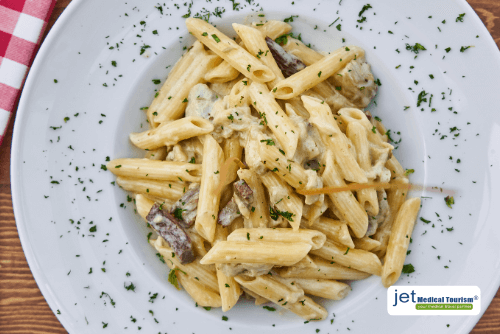
Eat pasta occasionally (not every day) and in small portions. Chew every bite of pasta slowly and do not swallow it in a hurry. Rapid eating of pasta can block the tiny hole that leads into your stomach and create complications.
Remember that pasta is delicious but it contains too many calories. If you eat it regularly or eat in large portions, it will consume a substantial part of your daily calorie intake. Your goal should be to maintain a healthy, low calorie diet in order to achieve your ideal body weight. Nausea, vomiting, gastric disorders and dumping syndrome are the risks you will face if you ignore your dietary guidelines and eat too much pasta.
CHECK THIS TOO: Gastric bypass recovery time
What fruit can you eat after gastric bypass
Choose low carb fruits after gastric bypass at least until you have reached your ideal body weight. Some of the recommended fruits include apple, pear, blueberries, blackberries, cantaloupe, and grapefruit. Fruits such as pineapple, cherries and banana are considered high-carb, so limit their intake. Watermelon is good, but it contains high sugars. Here are some tips for eating fruit after gastric bypass:
- Choose seasonal and local fruit as far as possible because it will always be fresher and more nutritious.
- If you have no option but to buy frozen fruit, try to select items that contain no added sugars.
- When you buy canned fruit, try to ensure that it is stored in its own natural juice, and not sugar syrup.
- Be mindful of your fruit servings as one average serving may have as much as 12 to 15 grams of carbs.
CHECK IT OUT: Gastric bypass post op diet
Can you drink carbonated beverages after gastric bypass
No, carbonated beverages after gastric bypass are not recommended. You will certainly need to avoid sodas and other fizzy carbonated drinks for the first few months. But even in the long run, drinking carbonated beverages is one of the things you can’t do after gastric bypass. The problem is that these drinks contain bubbles, which can create excess air in your post-surgery gastric pouch.
This will cause side effects, such as nausea, stomach ache, bloating, gas and general abdominal discomfort. Secondly, carbonated drinks contain empty calories, which will hamper your weight loss progress. Finally, you should know that many carbonated beverages include caffeine. Caffeine causes poor hydration, acid reflux, and interferes with the absorption of nutrients in your body.
When can I eat salad after gastric bypass
You can start eating salad about three months after gastric bypass. Salads include raw veggies and raw fruits that are harder to digest in the early days when your stomach and intestine are still healing. During this period, you may include some cooked veggies in your diet as recommended by your nutritionist.
From the fourth month after your Roux-en-Y surgery, you may start eating raw vegetable salads to complement your intake of proteins. If you want a crunchy feeling with low carbs, try lettuce wraps. Focus on colorful salads, such as green, yellow, orange, and red bell peppers. Add a dash of garlic, lemon, and herbs to enjoy healthy and delicious salads.
Can you eat popcorn after gastric bypass
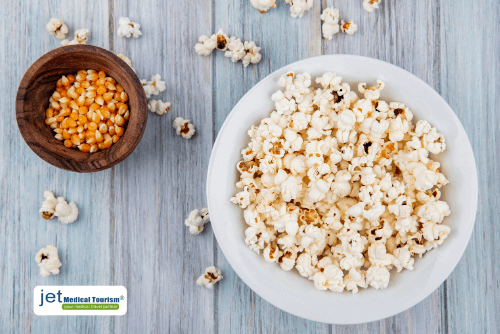
In the long run, you can occasionally eat popcorn for taste. A salient idea is to first eat the lean proteins, veggies and other healthy foods as part of your meal. Thereafter, if you really wish to eat popcorn, eat it last. This will ensure that you naturally consume less popcorn at any given time. In any case, avoid salt and butter when you do want to eat a little popcorn.
Alcohol after gastric bypass
Alcohol and gastric bypass surgery do not go together. Make sure you are committed to avoiding alcohol after Roux-en-Y surgery for at least three to six months. Following your surgery, the alcohol absorption in your body may occur more rapidly, which will make it a more potent drink. You may risk becoming alcohol-dependent if you drink excessively after this surgery.
Beer after gastric bypass
Beer after gastric bypass is not recommended for minimum three months. Thereafter, you can discuss with your nutritionist or healthcare provider about drinking beer in moderation. Their professional advice will be based on your unique medical condition and your weight loss goals. When you want to drink beer occasionally, choose a brand with lower alcohol content.
Drinking wine after gastric bypass
Wine contains at least two times the calories of an average carbonated drink. Clearly, if you are serious about eliminating obesity and achieving maximum weight loss, you will want to avoid drinking wine. In the first three months, your bariatric surgeon will anyway recommend you to refrain from drinking wine because it also has high alcohol content.
RELATED READ: Drinking alcohol after gastric sleeve
Can you drink coffee after gastric bypass surgery

The ideal situation would be to avoid drinking coffee for about six months so that your new stomach is completely healed and your body has adapted to the smaller pouch. Here are a few reasons why coffee drinking is one of the things you can’t do after Roux-en-Y surgery.
- Coffee contains caffeine, which is acidic and could irritate your delicate stomach lining.
- Some patients complain of acid reflux and digestion issues after drinking coffee post-surgery.
- Coffee will lower your body’s ability to absorb iron and calcium, which is bad after you have had a malabsorptive surgery.
- Caffeine has diuretic effects and contributes to dehydration.
RELATED READ: Coffee after bariatric surgery: Is it safe?
Exercise after gastric bypass
Exercise after gastric bypass should become a lifelong habit for sustainable weight loss results. Here are a few things to keep in mind regarding your exercise and fitness after gastric bypass:
- When: You can start walking within one or two days after your Roux-en-Y surgery. Begin with light exercises as directed by your surgeon in about three to four weeks after the surgery. In about three months, you can start more vigorous exercises.
- How: In the long run, your goal should be to perform at least three hours of moderate exercises every week. These may include jogging, brisk walking, light exercise machines at the gym, swimming, and Zumba. Choose your exercises according to your age and health.
- What: Your fitness regimen after gastric bypass should include flexibility exercises, strength (resistance) exercises, and cardio (aerobic) exercises. If you wish to avoid the gym, consider using home exercise videos. Learn new exercises only from a fitness instructor.
YOU MIGHT ALSO LIKE: Should I start to exercise after bariatric surgery?
Air travel after gastric bypass surgery
Air travel after gastric bypass surgery is allowed after one week for short haul flights. If you plan to take a long haul flight, it is safe to wait for at least three weeks post-surgery. Inform your airline in advance about your condition to know if they have any special guidance for you. If you are going to fly shortly after Roux-en-Y surgery, go through the lineup that is designated for people with medical needs.
Have more queries on what things to avoid after gastric bypass? Consult experts at Jet Medical Tourism®
Things you can’t do after gastric bypass are not going to limit your lifestyle. On the contrary, avoiding poor habits will only enhance and enrich your life. Roux-en-Y surgery will open up a world of possibilities for you. You can easily do things that you could never dare to attempt before.
Let Jet Medical Tourism® be your partner in this transformative journey that can change your life. We have the expertise and dedication to help you achieve your weight loss goals so that you can take back the control of your own life. To learn more about the things to avoid after gastric bypass, call our experts today!
Other useful gastric bypass surgery articles
- What is gastric bypass surgery
- Gastric bypass recovery time
- Gastric bypass requirements: Am I a good candidate for it?
- How much does gastric bypass cost?
- Gastric bypass before and after pictures


